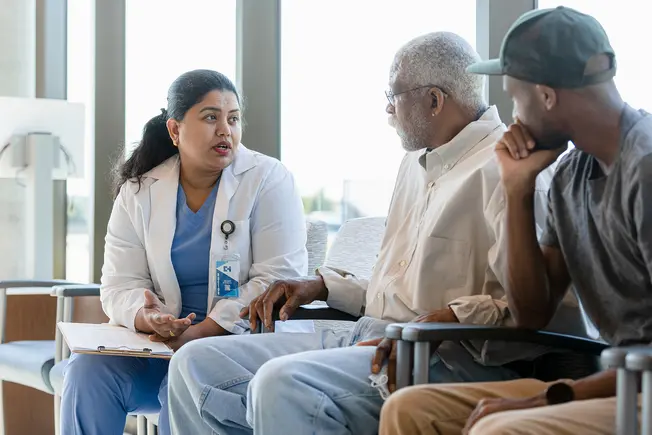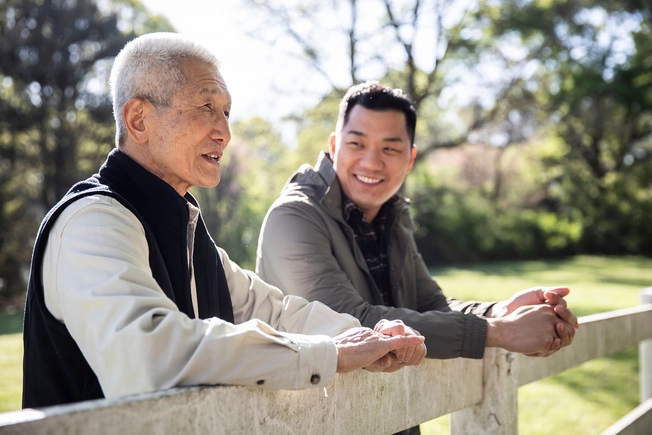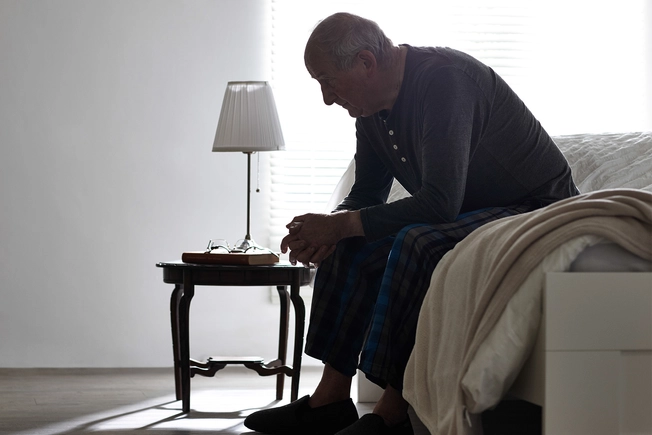- Overview
- Causes & Risks
- Symptoms, Stages & Types
- Tests & Diagnosis
- Your Prostate Cancer Care Team
- Treatment
- Remission & Recurrence
- Living With
- Support & Resources
- Appointment Prep
- View Full Guide
How to Support a Parent With Prostate Cancer


When a Parent Has Prostate Cancer
After a prostate cancer diagnosis, your parent will have to take in a lot of information about the condition, learn about and decide on treatment options, and go to frequent medical appointments. Here’s how you can support them through it all.

Educate Yourself
One way to help is by learning as much as you can about the disease and how it’s treated. This will better equip you to support your parent in any way they need. You can help them understand the options, take part in appointments and care, and be an advocate along the way.

Help Navigate the Costs of Care
People are often surprised by the bills they receive throughout treatment, even with health insurance. You can help out by offering to find out what your parent can expect to pay. You might start by calling the health insurance company. Their health care facility might also have a professional such as a financial navigator who can help you understand and plan for these costs.

Help With Appointments
Cancer care comes with numerous appointments. It may be a huge relief to your parent if you handle the scheduling of these visits. You can also drive to and from the clinic so they don’t have to worry about traffic and parking.

Be an Extra Set of Ears
Research suggests that people living with cancer may not catch everything their doctor says during their appointments and miss important information about their care. Offer to attend doctor visits with your parent. If they agree, come prepared with questions to ask the doctor and take notes.

Understand the Goals of Care
When you hear about your parent’s treatment choices, your instinct may be to push for the most aggressive treatment available. But their wishes might not be the same as yours. The most aggressive option, for example, could also be the one that takes the biggest toll on quality of life. Find out what matters most to your parent, and let that guide your conversations.

Take Part in Treatment Days
Treatment days are long and can wear a person out. Encourage your parent to let you come along. Depending on the treatment type, they might want company during a long chemo infusion. They may need help after treatment, especially if it requires anesthesia.

Help Them Get Moving
In general, moving around is good for you before, during, and after cancer treatment. Whether they’ve had chemo, surgery, or a brachytherapy procedure, it’s typically OK to get up and walk around the same day. How much your parent can move around depends on the treatment type, the doctor’s recommendations, and how your parent feels. Find out what’s safe, see how they feel, and then offer to walk with them as soon as they’re ready.

Prepare Meals
Stocking the freezer and fridge with easy-to-prepare meals is a great way to support someone going through cancer treatments. Keep in mind that appetite and nutritional needs might be different than they are in typical daily life. Mood can affect appetite, too. Ask what your parent wants and needs, and check in with the cancer care team to be sure you’re providing good options for their stage of care.

Be There Through Recovery
If your parent has surgery, it may be a couple of months before they’re back to all regular activities. If they’re in chemotherapy, they’ll have some days of downtime between infusions. Take stock of what your parent won’t be able to do for themselves while in recovery and offer to pick up the slack.

Keep an Eye on Mood
Stress, anxiety, fear, and even feelings of depression are normal during cancer diagnosis and treatment. If your parent seems overwhelmed by these kinds of emotions, it may be time to suggest they see a professional, such as a licensed counselor or psychiatrist.

Don’t Forget to Take Care of Yourself
It’s common for family caregivers to put their loved one’s needs ahead of their own. But this can leave you feeling sad, overwhelmed, and burned out. Make time for yourself. Remember to eat right, exercise, and get the sleep you need. If you need help coping, look for counseling or a support group for family caregivers.